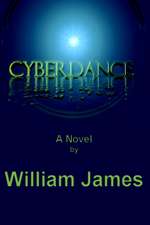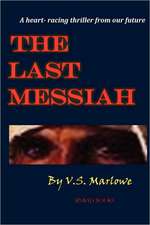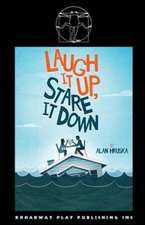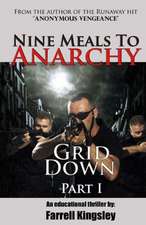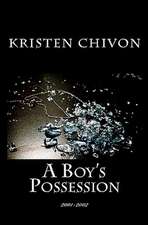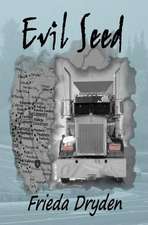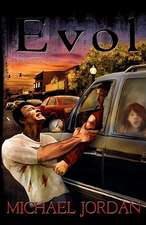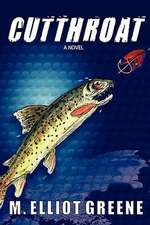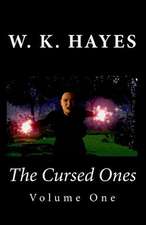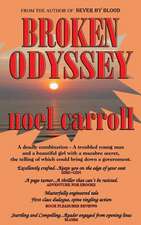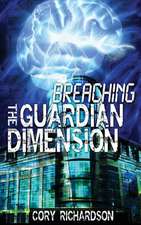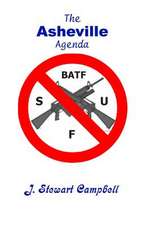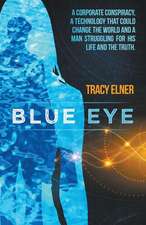Pardon the Ravens
Autor Alan Hruskaen Limba Engleză Paperback – 3 oct 2016
"Vividly real and quite compelling…fans of legal-thriller stars like John Grisham, John Lescroart, William Lashner, and especially Scott Turow will want to add this fine novel to their must-read lists."—Library Journal
This paperback edition of the fast-paced legal thriller set in the Mad Men era grabs you and doesn't let go. Gifted young New York lawyer Alec Brno gets the career boost of a lifetime: the opportunity to try a huge fraud case making international headlines. But he risks it all when he falls for an alluring young woman whose estranged husband is a sadistic Mafia don—and the criminal mastermind behind Alec's case.
This paperback edition of the fast-paced legal thriller set in the Mad Men era grabs you and doesn't let go. Gifted young New York lawyer Alec Brno gets the career boost of a lifetime: the opportunity to try a huge fraud case making international headlines. But he risks it all when he falls for an alluring young woman whose estranged husband is a sadistic Mafia don—and the criminal mastermind behind Alec's case.
Preț: 94.45 lei
Nou
Puncte Express: 142
Preț estimativ în valută:
18.07€ • 18.92$ • 14.95£
18.07€ • 18.92$ • 14.95£
Carte disponibilă
Livrare economică 15-29 martie
Preluare comenzi: 021 569.72.76
Specificații
ISBN-13: 9781938849886
ISBN-10: 1938849884
Pagini: 360
Dimensiuni: 140 x 216 mm
Greutate: 0.41 kg
Editura: Prospect Park Books
ISBN-10: 1938849884
Pagini: 360
Dimensiuni: 140 x 216 mm
Greutate: 0.41 kg
Editura: Prospect Park Books
Notă biografică
Alan Hruska is a native of New York and a graduate of Yale University and Yale Law School. He is a former trial lawyer who has represented Henry Kissinger, William Paley, Sam Walton, Katherine Graham and many others. As cofounder of Soho Press, he currently serves as chairman of the board. He has also written and directed a number of movies, including Nola, The Warrior Class, and Reunion, and several plays. Pardon the Ravens is his third novel.
Extras
Chapter One
November 3, 1961. New York. Wall Street. Center of the universe. Bounding up from the subway, Alec Brno sails forth.
He’s noticed and noticing, this gangly young man, his longish face questioning, his brown hair awry. Heading towards Water Street into the sun, he pauses at Broad. Rivers of boaters -- white straw hats with bright silk bands -- stream on currents of lawyers and brokers. And guys rushing, like Alec: hatless, eager. Guys thinking, I’m ready! Depression babies in their ill-fitting suits.
To the columnists, they are “The Silent Generation,” which misses the point while unintentionally abetting it. Graduates of the Fifties aren’t shouting slogans down the corridors of power. They’re too busy – quietly -- taking over what the Establishment has.
And Alec Brno is especially motivated. He’s a poor kid from Queens with an unpronounceable last name, the Czechs, for obscure reasons, having disdained the need to make explicit indispensable vowel sounds. To those in power, a person with such a name coming from such a place has sizable obstacles to overcome – a fact of life of which Alec is well aware.
In point of fact, Alec’s family is more Organized Labor than ethnic. Union Socialists, almost Communists, for whom Wall Street has particular abhorrence. These are people, Alec thinks, with big hearts, intolerance for injustice and little understanding of economics. They would regard the firm employing Alec as the Mecca of depravity, and its presiding partner, former Judge of the Federal Court of Appeals, Ben Braddock, as the socialist equivalent of the anti-Christ. By their standards, those assessments would be dead accurate. Kendall, Blake, Steele & Braddock is not simply the main legal weapon of big business in America; in important respects, it runs the institutions it services.
Two years earlier, Alec had signed on with Kendall, Blake right out of law school. Then, the firm had been housed at 25 Broad Street -- a squat pile of some thirty floors, deco in style, traversed by elevators that made a great deal of clanking noise and took forever to go in either direction. But new buildings continually arise in the City, and its successful inhabitants grow into them. Now, every morning, Alec speeds upwards soundlessly to the virtual top of a sixty-story glass tower on Water Street. He has his own small office on the fifty-eighth floor with a spectacular view of almost the entirety of Manhattan.
Alec is drawn to that view as soon as he enters his office and stands admiring it for some minutes before settling down at his desk. The partner he works for, Frank Macalister, is still in Miami, finishing a trial. It’s the only Macalister case Alec isn’t assigned to, which means he’s expected to deal with the rest of Mac’s caseload. Can be time-consuming, keeping everything from blowing up in his face, but it’s a lot easier dealing with Mac’s opponents and co-counsel than with Mac himself.
For the last several days, Alec has been covering for Mac, representing Biogram Pharmaceuticals in a five-defendant price-fixing trial, one of the few government actions brought under the state antitrust laws. Normally, Alec would be in court an hour beforehand to get everything ready for the “first chair.” As it is, he has to swing by the office first for Mac’s letters and messages. He leafs through them now, then moves the stack to a corner of his desk. None requires immediate attention. He’s got the luxury of a few minutes to think about what the morning might bring about.
He leans back and visualizes the courtroom. He sees, facing the bench, a semicircle made up of six small tables. Behind each will sit the senior trial counsel for each party accompanied by one or more junior partners, or in the case of the State Attorney General’s Office, several less senior trial attorneys. Behind them will be their associates, and behind them, patent counsel, for there are charges in the case of monopolization by the fraudulent procurement of patents. And behind each of those tiers there will come and go the various experts, paralegals and other support personnel for each team. At the table for Biogram, in splendid isolation, Alec Brno will reign: a second-year associate, “first chair” temporarily, at the first trial he’s ever seen first hand, much less participated in.
The witness for the day, and probably several more, will be J.J. Tierney, CEO of Pharmex Pharmaceuticals, holder of the principal patent. He’s the pivotal witness in the case. According to the government, it was Tierney who masterminded the price fix. The possibilities that Alec might cross-examine this man in Mac’s absence are slim to none. What Tierney will say on direct examination has been heavily negotiated and agreed upon. If Alec were to speak at all, it would most likely be to read the statement that Mac wrote out for him with a smirk: “No questions for this witness, your Honor.” Alec hopes he can manage to get that out without embarrassing himself.
One of these days, he thinks, he’ll head up a litigation team and be comfortable enough in court to command attention, not let it command him. So far as trial practice goes, he’s still inexperienced enough to be influenced by the movies.
He packs his black leather litigation bag – or “lit bag” as it’s called -- and makes for the elevators. The image in his head is of Raymond Burr’s District Attorney in A Place in the Sun slamming his cane on the counsel table. Such histrionics in State of New York versus Pharmex Pharmaceuticals, et. al? Emerging from the elevator car, Alec laughs out loud, almost in the face of the Presiding Partner of his firm: Judge Benjamin Braddock, a long, gaunt, white-haired man in a black Homburg, who is waiting to get on.
Disapproval flickers in the judge’s sharp gaze with no sign he knows or cares who Alex is.
November 3, 1961. New York. Wall Street. Center of the universe. Bounding up from the subway, Alec Brno sails forth.
He’s noticed and noticing, this gangly young man, his longish face questioning, his brown hair awry. Heading towards Water Street into the sun, he pauses at Broad. Rivers of boaters -- white straw hats with bright silk bands -- stream on currents of lawyers and brokers. And guys rushing, like Alec: hatless, eager. Guys thinking, I’m ready! Depression babies in their ill-fitting suits.
To the columnists, they are “The Silent Generation,” which misses the point while unintentionally abetting it. Graduates of the Fifties aren’t shouting slogans down the corridors of power. They’re too busy – quietly -- taking over what the Establishment has.
And Alec Brno is especially motivated. He’s a poor kid from Queens with an unpronounceable last name, the Czechs, for obscure reasons, having disdained the need to make explicit indispensable vowel sounds. To those in power, a person with such a name coming from such a place has sizable obstacles to overcome – a fact of life of which Alec is well aware.
In point of fact, Alec’s family is more Organized Labor than ethnic. Union Socialists, almost Communists, for whom Wall Street has particular abhorrence. These are people, Alec thinks, with big hearts, intolerance for injustice and little understanding of economics. They would regard the firm employing Alec as the Mecca of depravity, and its presiding partner, former Judge of the Federal Court of Appeals, Ben Braddock, as the socialist equivalent of the anti-Christ. By their standards, those assessments would be dead accurate. Kendall, Blake, Steele & Braddock is not simply the main legal weapon of big business in America; in important respects, it runs the institutions it services.
Two years earlier, Alec had signed on with Kendall, Blake right out of law school. Then, the firm had been housed at 25 Broad Street -- a squat pile of some thirty floors, deco in style, traversed by elevators that made a great deal of clanking noise and took forever to go in either direction. But new buildings continually arise in the City, and its successful inhabitants grow into them. Now, every morning, Alec speeds upwards soundlessly to the virtual top of a sixty-story glass tower on Water Street. He has his own small office on the fifty-eighth floor with a spectacular view of almost the entirety of Manhattan.
Alec is drawn to that view as soon as he enters his office and stands admiring it for some minutes before settling down at his desk. The partner he works for, Frank Macalister, is still in Miami, finishing a trial. It’s the only Macalister case Alec isn’t assigned to, which means he’s expected to deal with the rest of Mac’s caseload. Can be time-consuming, keeping everything from blowing up in his face, but it’s a lot easier dealing with Mac’s opponents and co-counsel than with Mac himself.
For the last several days, Alec has been covering for Mac, representing Biogram Pharmaceuticals in a five-defendant price-fixing trial, one of the few government actions brought under the state antitrust laws. Normally, Alec would be in court an hour beforehand to get everything ready for the “first chair.” As it is, he has to swing by the office first for Mac’s letters and messages. He leafs through them now, then moves the stack to a corner of his desk. None requires immediate attention. He’s got the luxury of a few minutes to think about what the morning might bring about.
He leans back and visualizes the courtroom. He sees, facing the bench, a semicircle made up of six small tables. Behind each will sit the senior trial counsel for each party accompanied by one or more junior partners, or in the case of the State Attorney General’s Office, several less senior trial attorneys. Behind them will be their associates, and behind them, patent counsel, for there are charges in the case of monopolization by the fraudulent procurement of patents. And behind each of those tiers there will come and go the various experts, paralegals and other support personnel for each team. At the table for Biogram, in splendid isolation, Alec Brno will reign: a second-year associate, “first chair” temporarily, at the first trial he’s ever seen first hand, much less participated in.
The witness for the day, and probably several more, will be J.J. Tierney, CEO of Pharmex Pharmaceuticals, holder of the principal patent. He’s the pivotal witness in the case. According to the government, it was Tierney who masterminded the price fix. The possibilities that Alec might cross-examine this man in Mac’s absence are slim to none. What Tierney will say on direct examination has been heavily negotiated and agreed upon. If Alec were to speak at all, it would most likely be to read the statement that Mac wrote out for him with a smirk: “No questions for this witness, your Honor.” Alec hopes he can manage to get that out without embarrassing himself.
One of these days, he thinks, he’ll head up a litigation team and be comfortable enough in court to command attention, not let it command him. So far as trial practice goes, he’s still inexperienced enough to be influenced by the movies.
He packs his black leather litigation bag – or “lit bag” as it’s called -- and makes for the elevators. The image in his head is of Raymond Burr’s District Attorney in A Place in the Sun slamming his cane on the counsel table. Such histrionics in State of New York versus Pharmex Pharmaceuticals, et. al? Emerging from the elevator car, Alec laughs out loud, almost in the face of the Presiding Partner of his firm: Judge Benjamin Braddock, a long, gaunt, white-haired man in a black Homburg, who is waiting to get on.
Disapproval flickers in the judge’s sharp gaze with no sign he knows or cares who Alex is.
Descriere
The fast-paced tale of a budding lawyer who falls in love with his lead witness in a high-profile case.

